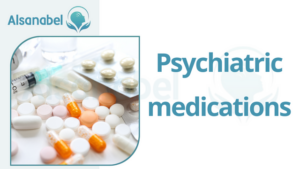Role of Medication in Psychological Treatment 2024
- Category ADHD
In the field of psychology, medication is often used in conjunction with psychotherapy as a form of psychological treatment. Medication can help alleviate symptoms of mental health conditions and improve an individual’s quality of life. However, it is important to note that medication is not a stand-alone treatment for mental health issues. Rather, it is only one part of a comprehensive treatment plan.
Table of Contents
ToggleRole of Medication in Psychological Treatment
Medication can be used to treat a variety of mental health conditions, including depression, anxiety, bipolar disorder, and schizophrenia, among others. Psychiatric medications work by altering the levels of certain chemicals in the brain, such as neurotransmitters, which can help regulate moods and emotions.
While medications can be effective in treating mental health conditions, they also come with potential side effects. Common side effects include nausea, dizziness, drowsiness, weight gain, and sexual dysfunction. It is important for individuals to work closely with their healthcare provider to find the right medication and dosage that works for them while minimizing any potential side effects.
The Importance of Integrated Treatment
Medication should not be the sole focus of a psychological treatment plan. It is important to integrate medication with other forms of therapy, such as cognitive-behavioral therapy and psychotherapy. Integrated treatment has been shown to be more effective in treating mental health conditions than medication alone.
In addition, individuals with mental health conditions should also prioritize self-care practices, such as exercise, healthy eating, and stress reduction techniques, in conjunction with medication and therapy. These practices can help improve overall health and well-being and may also help alleviate symptoms of mental health conditions.
Psychiatric medications
Psychiatric medications can be categorized into different types, each serving a specific purpose in treating mental health conditions. The most commonly prescribed types include antidepressants and antipsychotics.

Antidepressants
Antidepressants are generally used to treat depression, anxiety disorders, and obsessive-compulsive disorder (OCD). They work by increasing the levels of neurotransmitters in the brain, such as serotonin and norepinephrine, which regulate mood and emotions. Commonly prescribed antidepressants include selective serotonin reuptake inhibitors (SSRIs), serotonin-norepinephrine reuptake inhibitors (SNRIs), and tricyclic antidepressants (TCAs).
On the other hand, antipsychotics are primarily used in treating schizophrenia, bipolar disorder, and other psychotic disorders. They work by blocking dopamine receptors in the brain, which help regulate moods and perceptions. Typical antipsychotics, like haloperidol, are designed to target dopamine receptors, whereas atypical antipsychotics, like olanzapine and risperidone, target both dopamine and serotonin receptors.
It is important to note that medication should always be used as part of a comprehensive treatment plan that includes therapy and self-care practices. Antidepressants and antipsychotics, while effective in treating mental health conditions, can also come with side effects such as weight gain, drowsiness, and sexual dysfunction. As such, it is important for individuals to work closely with their healthcare provider to monitor any potential side effects and adjust the dosage or medication as needed.
Combining medication and therapy
Combining medication and therapy can significantly improve treatment outcomes for individuals with mental health conditions. While medication can help alleviate symptoms, therapy can provide individuals with the tools and skills needed to manage their conditions long-term.
Improved treatment outcomes result from the combination of medication and therapy, as each treatment modality addresses different aspects of mental illness. Medications can help reduce the intensity of symptoms, allowing individuals to engage in therapy fully. Therapy can then provide individuals with tools and skills needed to manage their symptoms in real-life situations, leading to long-term success in treatment.
Additionally, combining medication and therapy can increase adherence to treatment. Individuals who receive therapy while taking medication are more likely to remain engaged in treatment and to take their medication as prescribed, leading to better outcomes overall.
It’s essential to note that therapy should always be used alongside medication, forming a comprehensive approach to mental health care. While medication can help relieve symptoms, therapy can provide individuals with the skills and support needed to manage their symptoms for the long-term.
Therapy Complements Medication
When it comes to treating mental health conditions, medication can play an essential role in complementing other forms of treatment. While medication can help alleviate symptoms, other forms of therapy can provide individuals with necessary skills and tools needed to manage their conditions long-term.

Forms of Therapy
One form of therapy that complements medication is cognitive-behavioral therapy (CBT). CBT focuses on identifying and changing negative thought patterns and behaviors that contribute to mental health conditions. By addressing these patterns, individuals can learn how to manage their symptoms effectively and increase their overall quality of life.
Another form of therapy that complements medication is eye movement desensitization and reprocessing (EMDR). EMDR is particularly effective for individuals with post-traumatic stress disorder (PTSD) or traumatic experiences. This technique helps individuals process and reduce the emotional distress associated with traumatic events by focusing on specific memories and utilizing eye movements or other forms of bilateral stimulation.
When medication is combined with CBT or EMDR, individuals are more likely to achieve improved treatment outcomes. Medication can help reduce the intensity of symptoms, allowing individuals to engage in therapy fully. Therapy can then provide individuals with tools and skills needed to manage their symptoms in real-life situations, leading to long-term success in treatment.
Challenges of Medication in Psychological Treatment
Psychological disorders, including depression, anxiety, and bipolar disorder, can often be treated with medications. However, using medications in psychological treatment is not without its challenges. Here are some key challenges that individuals may face when using medications as part of their treatment plan:
Individual Differences in Response
One of the most significant challenges of medication in psychological treatment is that individuals are likely to have varying responses to the medication. Factors such as age, gender, genetics, and lifestyle can all impact how an individual responds to medication. This means that finding the right medication and dosage for an individual can be a trial-and-error process.
Additionally, some individuals may experience side effects that make it difficult to continue using medication. Healthcare providers must monitor patients closely to ensure that medication is being used effectively and without adverse effects.
Stigma and Misconceptions About Medications
Another challenge of medication use in psychological treatment is stigma and misconceptions surrounding medications. Many individuals may feel ashamed or embarrassed about using medication to treat mental health conditions, leading them to avoid using medication altogether.
Additionally, some individuals may have misconceptions about medications, such as believing that they are “happy pills” that will make them numb or that they are only prescribed to individuals with severe mental illness. To overcome these challenges, healthcare providers must educate patients about the benefits and limitations of medication as part of a comprehensive treatment plan.
Despite these challenges, medication can be a useful tool in treating psychological disorders when used appropriately. Healthcare providers must work collaboratively with patients to find the most effective treatment plan, which may involve medication, therapy, or a combination of both. By working together, individuals can achieve improved treatment outcomes and better manage their symptoms long-term.
Psychiatrists
Psychological disorders are complex and can be challenging to treat. While therapy is a crucial component of treatment, medication is often necessary for some individuals to manage their symptoms effectively. But who can prescribe medications for psychological treatment?
Psychiatrists are medical doctors who specialize in mental health and can prescribe medications for psychological treatment. They have extensive training in the use of medications for mental health conditions and can closely monitor how an individual responds to treatment. They can also provide therapy, making them a one-stop-shop for comprehensive treatment.

Primary care physicians, such as family doctors, can also prescribe medications for psychological treatment. However, their training in mental health may be limited, and they may not have as much experience prescribing medications for mental health conditions. They may refer individuals to a psychiatrist for more specialized care if needed.
Regardless of who prescribes medications for psychological treatment, it’s essential to work closely with the healthcare provider to ensure that medication is being used appropriately. This includes monitoring for side effects and adjusting dosage as needed. It’s also crucial to continue with therapy as part of treatment to address any underlying issues and learn coping skills to manage symptoms.
Active Involvement in Treatment
Being an active participant in treatment includes attending all appointments with the healthcare provider and following the medication regimen as prescribed. It is important for patients to inform their healthcare provider about any changes in their symptoms or side effects experienced as a result of the medication. Skipping doses or stopping medication abruptly can lead to unfavorable outcomes and should be avoided.
Importance of Communication with Provider
Communication with the healthcare provider is essential for successful treatment. Patients should not hesitate to ask questions or express concerns about their medication regimen. It is also vital for patients to inform their provider of any other medications, including over-the-counter medications and supplements they are taking. These can interact with psychotropic medications and lead to adverse effects.
Patients should report any concerning symptoms to their healthcare provider immediately, including suicidal ideation or behavior. It is also crucial for patients to communicate any changes in mood or behavior as it can indicate the need to adjust medications or add additional treatment modalities.
In conclusion, medication treatment for psychological disorders serves an essential role in the management of symptoms. Patients should take an active role in their treatment, communicate transparently with their healthcare provider, and be open to trying different medications and treatment modalities.









